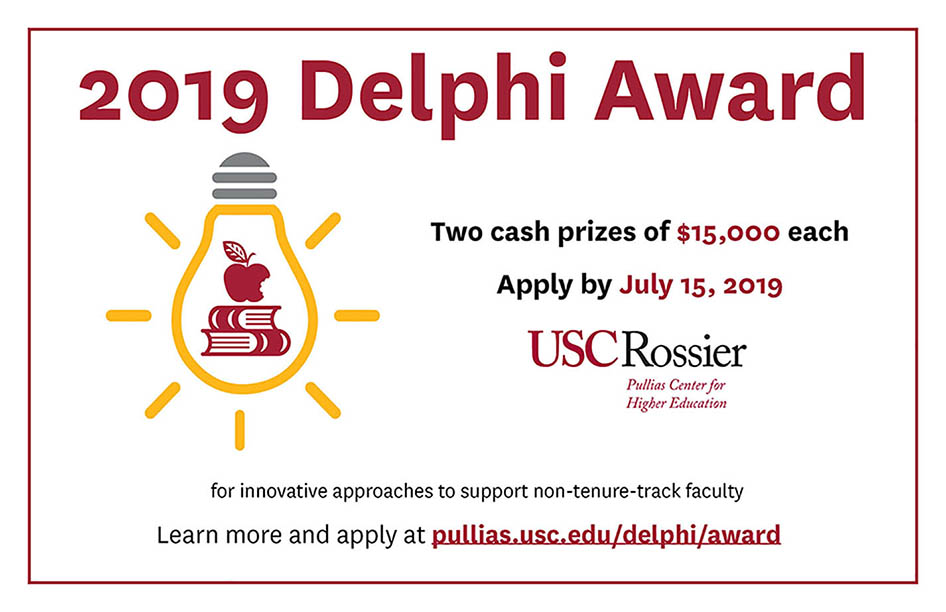
Applications open for 2019 Delphi Award
Two awards of $15,000 each recognize noteworthy efforts to support non-tenure-track faculty.
The Pullias Center for Higher Education at the USC Rossier School of Education today opened applications for the 2019 Delphi Award. The $15,000 cash award is given annually to two individuals or groups who have worked to support adjunct, contingent and non-tenure-track faculty in promoting student success.
“Although non-tenure-track faculty teach the majority of classes at colleges and universities today, these faculty often are rarely given the kind of support and security that tenured and tenure-track faculty are given,” said Adrianna Kezar, co-director of the Pullias Center. “The Delphi Award is one small effort to help change that culture, so campuses start investing in their part-time, adjunct and contingent faculty and the important role they play in students’ lives.”
The award is now in its second year.The inaugural year for the award resulted in entries from individuals and organizations across the country, and the winners, Harper College and California State University, Dominguez Hills, were recognized at the 2019 Association of American Colleges & Universities (AAC&U) annual meeting on Jan. 24 in Atlanta, Ga. This year’s winners too will be fêted at the AAC&U annual meeting, to be held Feb. 14 to 16, 2020, in San Francisco, Calif.
The Delphi Award is an initiative of the Delphi Project on the Changing Faculty and Student Success, an effort of the Pullias Center dedicated to enhancing awareness about changing faculty trends using research and data to better support faculty off the tenure track and to help create new faculty models to support higher education institutions in the future.
Great campuses support all faculty
Non-tenure-track positions today make up more than 70 percent of instructional faculty in American higher education. Compared to their tenured or tenure-track counterparts, non-tenure-track faculty are often hired last minute at far lower wages, and thus struggle to balance heavy teaching loads at multiple institutions with limited time to prepare their courses and limited support to improve their curriculum design or pedagogy. Studies by the Delphi Project have shown these challenges for non-tenure-track faculty correlate to lower students success rates.
By providing an incentive to better support these non-tenure-track faculty, the Delphi Award aims to push higher education institutions to support all, not just some, faculty.
“When we fail to support adjunct and other non-tenure-track faculty, we ultimately fail our students,” said Kezar. “That’s why the ultimate aim of this award is really to support students. When faculty members have the time and resources to fully invest in teaching and mentoring to the best of their abilities, this can really make a world of difference—particularly first-generation, low-income and underserved minority students.”
In addition to championing and bringing attention to existing efforts to support non-tenure-track faculty and new faculty models, the Delphi Award shares best practices of the winning applicants to allow other postsecondary institutions to adopt these successful models on additional campuses. The initiatives that Harper College and CSUDH undertook to win the inaugural awards, for example, have been added to the Delphi Project’s database of best example practices, available on the Delphi Project website, along with other tools and resources to support non-tenure-track faculty.
“Harper College and CSUDH really set a high bar for the Delphi Award,” said Daniel Scott, a research assistant at the Pullias Center. “Their work was really innovative and effective in changing campus climates to better include and support non-tenure-track faculty.”
The Delphi Award is funded by a grant from the Teagle Foundation and is given in partnership with the AAC&U. The application period for the 2019 Delphi Award ends July 15, 2019.